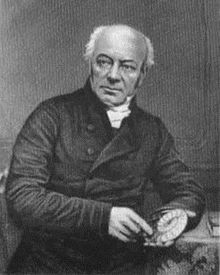William Buckland
William Buckland | |
|---|---|
 William Buckland, ca. 1845 | |
| Born | 12 March 1784 |
| Died | 14 August 1856 (aged 72) |
| Nationality | English |
| Alma mater | Winchester College Corpus Christi College, Oxford |
| Known for | Megalosaurus |
| Awards | Copley Medal (1822) |
| Scientific career | |
| Fields | Palaeontology |

William Buckland DD FRS (12 March 1784 – 14 August 1856) was an English theologian who became Dean of Westminster. He was also a geologist and palaeontologist.
Buckland wrote the first full account of a fossil dinosaur, which he named Megalosaurus. He proved that Kirkdale Cave in Yorkshire had been a prehistoric hyena den, for which he was awarded the Copley Medal of the Royal Society. He was praised as an example of how scientific analysis could reconstruct events from the distant past. He was a pioneer in the use of fossilized faeces (he coined the term coprolites) to reconstruct ancient ecosystems.
In 1818, Buckland was elected a fellow of the Royal Society. He became Reader in Geology at Oxford University in 1819. His work Reliquiæ Diluvianæ was published in 1823 and became a best seller.[2]
However, over the next decade Buckland changed his mind. In his famous Bridgewater Treatise, Geology and mineralogy considered with reference to natural theology,[3] he said that the biblical account of Noah's flood could not be confirmed using geological evidence.[4] What had been taken as evidence of the 'Universal Deluge' two decades before was, he thought, evidence of a major glaciation.
Not only was Buckland's home filled with specimens – animal as well as mineral, live as well as dead – but he claimed to have eaten much of the animal kingdom, a practice known as zoöphagy.[5] In 1848 a piece of Louis XIV's mummified heart, taken from his tomb, was kept in a silver locket by the Archbishop of York. It was shown to Buckland, who ate it![6]
References
[change | change source]- ↑ Westminster Abbey
- ↑ Buckland, William (1824). Reliquiæ Diluvianæ: Or Observations on the Organic Remains Contained in Caves, Fissures, and Diluvial Gravel, and on Other Geological Phenomena, Attesting the Action of an Universal Deluge. J. Murray.
- ↑ Buckland, William 1836. Geology and mineralogy considered with reference to natural theology. London: William Pickering.
- ↑ Rudwick, Martin 2008. Worlds before Adam: the reconstruction of geohistory in the age of reform. The University of Chicago Press, p427. ISBN 978-0-226-73128-5
- ↑ Cadbury, Deborah (2000). The dinosaur hunters: a story of scientific rivalry and the discovery of the prehistoric world. ISBN 978-1-85702-959-8.
- ↑ "Westminster Abbey » William Buckland". westminster-abbey.org. Retrieved 17 January 2016.
